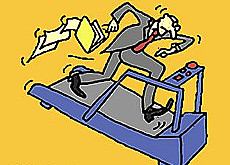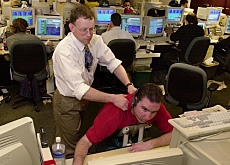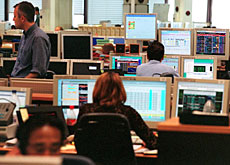Happiness is more than just more income

The quest for happiness is not to be found with an increasing salary or brand new car, economics professor Mathias Binswanger argues in a bestselling Swiss book.
Binswanger told swissinfo that economics was not just about making money but also about translating income into happiness, which was not always an easy process.
In his book The Treadmills of Happiness, Binswanger outlines a number of hurdles that people come across in their daily lives. They are treadmills that lead to stress without making people happier.
In short, people are experiencing increased pressure on their time and are looking in the wrong place for happiness.
swissinfo: In your research on happiness you describe the treadmills we are faced with in our daily lives. First, there’s the status treadmill on which we always want to keep ahead of others – at work and at play.
Mathias Binswanger: Yes, that’s right but that’s a zero-sum game. Not everybody can outperform everybody else. That’s of course also true with income. This treadmill continues in spite of the fact that people get richer, because we still want to be richer than others.
We show this by what we call status goods and a typical example would be cars. After the Second World War, you could impress people if you had a car but then soon too many people had a car so you needed a fancier car. Car manufacturers constantly create new status cars so that you can outperform others.
swissinfo: What about the hedonic treadmill… the pursuit of pleasure?
M.B.: We always adapt to higher material wealth or to higher incomes, so when we earn more income, we soon get used to it and it becomes normal. It’s the same with material goods. When we buy a new car, for example, we enjoy it for a time but soon it becomes normal and we don’t even waste a thought about it once we get into it in the morning.
It’s particularly true when you gain large sums of money. Investigations show that lottery winners are happy for a while, but if you ask how they feel after about a year, they are exactly as happy or unhappy as they were before winning the lottery. So, actually, in the long run, it’s not even worth winning the lottery.
swissinfo: The multi-option treadmill tends to suggest we have too many choices – whether it be television channels, food in the fridge or even investment opportunities. Can you explain that?
M.B.: The options in goods and services increase but there is something that remains constant and that is time. The day still has only 24 hours… and therefore it gets more and more difficult to make all the decisions we have to make. We know that people do not like too many options when they make decisions.
An example is TV. In the 1950s we had just one programme, but now if we want, we can watch thousands of channels – but it’s completely impossible to make a reasonable choice if you still want to do something else during the day other than just studying what’s on.
swissinfo: Then there are time-saving devices which you say aren’t really saving time. Can you give examples of them?
M.B.: We can do a lot of things faster so, theoretically, we could reduce the time we spend on some activities that we don’t particularly like and spend more time on activities we actually enjoy. Take the example of mobility. You can travel 100km a lot faster now than you could some decades ago – but as soon as you travel faster, people travel more frequently and over longer distances, so all the potential of saving time gets lost.
That’s [also] true for information technology. If we compare email to letters, an email saves a lot of time compared with writing a letter, but since we have had emails we of course exchange a lot more information than we did before, so even there we are not able to save any time.
swissinfo: Can you give an example of how we might slow down a bit on these treadmills?
M.B.: We have a ranking mania nowadays in many domains of life, so everywhere we compete for becoming the best, being in the top three or at least in the top ten. In the public sector, universities compete for being the best, schools do the same and so we artificially reinforce the status treadmill by this kind of thinking. We could slow down by stopping this ranking mania.
swissinfo: How happy are you and what do you do personally to practise what you preach?
M.B.: I should, of course, provide a good example and follow some of the recommendations I give in my book. If you look inside it there is a list of activities that make people happy and what make them unhappy. What really contributes to happiness is social life, while commuting, for example, is something that makes people particularly unhappy.
I’m actually living in the house next to the college, so my commuting time is about one or two minutes. I also really try to have an active social life. Another example how I try to fight the multi-option treadmill is that I completely eliminated some of my options. In my case this was watching TV. I stopped watching a couple of years ago and I can only recommend it.
swissinfo-interview: Robert Brookes in Olten
Binswanger is professor of economics at the College of Applied Sciences of Northwestern Switzerland in Olten and also lecturer at St Gallen University.
He graduated in economics from St Gallen University and received his PhD from Kassel University in Germany.
He has published books, articles and discussion papers in the fields of macroeconomics, environmental economics and finance.
Binswanger regularly contributes to the weekly Swiss economics newspapers Cash and Die Weltwoche.
His bestseller “Die Tretmühlen des Glücks” – The Treadmills of Happiness – was published in German in 2006 by Herder.

In compliance with the JTI standards
More: SWI swissinfo.ch certified by the Journalism Trust Initiative


You can find an overview of ongoing debates with our journalists here . Please join us!
If you want to start a conversation about a topic raised in this article or want to report factual errors, email us at english@swissinfo.ch.